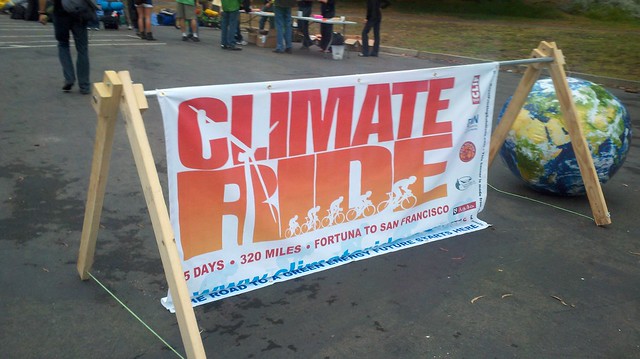I hate goodie bags.
My least favorite part of a charity or cause ride is trying to politely avoid taking the plastic bag full of coupons, tschotskes and sporty swag.
I already have a cabinet overflowing with water bottles and a library of reflective leg bands, including one that works like a slap bracelet a la 1990. I have so many free tote bags I could sell out the Safeway store — and not ask for paper or plastic. I hate to admit it, but, after the last ride I participated in, I put the t-shirt in the clothes’ recycling box outside my building before I even got in the shower.
Why am I such a free stuff Scrooge? Because nothing is free. Not for the planet, at least. Every item in that goodie bag raided resources from somewhere. Every item required energy to produce and fossil fuels to transport.
So when I showed up for Climate Ride it was refreshing to see an eco ethic right there at the registration table. When I got signed in, they handed me four things: A name tag for my bike, my Climate Ride jersey, a half-page outline of safety instructions and small business card that noted the responsible organizers were forgoing the giving of goodie bag filled with “a bunch of junk you’re just going to throw away.“
Finally! Someone said it!

A few hours later, on our journey to the start of the ride, we stopped at the Solar Living Institute and I saw a sign that reinforced the rationale against unsolicited freebies.
“In the U.S. we generate 11 billion tons of non-hazardous waste each year, 98 percent of which is pre-consumer waste created by mining, manufacturing, oil and gas and agricultural processes,” the sign said. “Municipal solid waste — what we call trash — account for less than 2 percent of that total.” So, for every one ton of junk we throw in the landfill, 20 tons of waste from the creation of that junk was thrown in a landfill somewhere else.
Those types of stats put yet another water bottle in different light.
We’re all here in California, pedaling 320 miles, to promote active transportation and renewable energy. But that little business card and our stop at the Solar Living Institute reminded me that, sometimes — well, a lot of the time — the most important thing we can do to conserve energy and protect the climate is to scale back our consumption habits.
Kudos to Climate Ride for connecting the dots.